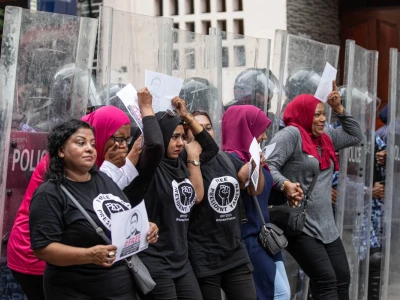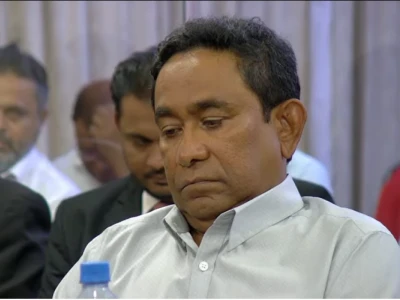
HC quashes curfew on 8 opposition activists as release condition
According to article 49 of the constitution, a person cannot be detained before the trial court pronounces a verdict, except under certain circumstances.
Top Stories
By
Fathmath Ahmed Shareef
High Court on Sunday quashed a Criminal Court order imposing a night time curfew as a release condition on eight people who were arrested during a series of protests by the opposition on the streets of Male.
As part of a series of protests by the opposition PPM-PNC, protesters blocked a bus in front of the party office on April 13. Videos of a group of protesters carrying the party flag and the national flag and standing in front of the bus and protesting went viral on social media.
Eight persons were arrested the same night for allegedly gathering in different parts of the city, shouting slogans, staging protests and obstructing public transport and police from performing their duties. On April 14, when the police approached the Criminal Court asking them to be remanded in police custody for 15 days, the court ordered their conditional release.
The conditions laid down by the court are:
-
To cooperate with the police investigation
-
To not travel out of Male without obtaining prior written permission
-
Not to step out of their places of residence between 9 pm and 6 am
-
For some, the condition was that they should not go out between 8 pm and 6 am
Not satisfied with the order, the eight filed an appeal seeking quashing of the trial court's order. The objections filed by the eight in the High Court are as follows:
-
The conditions for release violated the rights enshrined under article 49 of the constitution
-
While the condition of release should be based on the conditions laid down by the court to ensure that he or she is present in the court as per the court's wishes, the curfew violates the fundamental rights and liberties guaranteed to everyone in the constitution
The High Court, in its verdict on the appeal, set aside the trial court's order, saying it violated Section 60 of the Code of Criminal Procedure.
The High Court in its judgment said:
-
The Criminal Court judge ruled that they were being accused not of committing a serious criminal offence and could not substantiate grounds for their detention
-
If a person is granted conditional release, the court order should show that there is evidence to show that the person committed the crime
-
It is not known how the evidence was examined or the evidence was classified in the trial court order
According to article 49 of the constitution, a person cannot be detained before the trial court pronounces a verdict, except under certain circumstances. The circumstances mentioned in the article are as follows:
-
Fear of trying to conceal evidence or influence a person who is due to testify in the case against the accused
-
May not appear before the court
-
The possibility of escaping
-
Fear that if released on bail, the safety of the community may be at stake.




